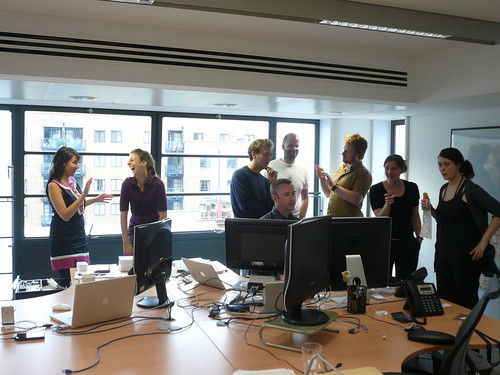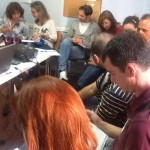Can Teachers Do Research?
Research and what teachers have to do with it, whether they should be doing it and, if so, how, has been a topic often discussed on #ELTchat on Twitter, a weekly discussion of teachers meeting online to talk about a topic of their choice. I help moderate this online discussion and in reviewing our summaries page, I was impressed with the fact that over the past two years, we have had not just one or two, but three #ELTchats on different aspects of teachers doing research. Reading through the summaries inspired me to write a short report of how I got started on research and how teachers could be involved as well.
My 1st action research project
The title of my research (my 2nd dissertation submitted towards my M.A. in Applied Linguistics at the University of Reading) was “Aims & Objectives: the Learner’s View”. It was supervised by Ronald White, an extremely helpful and supportive supervisor, who fed my brain with questions and great reading suggestions.
Research Question

Photo credit – morguefile.com
My main interest was to explore whether the learners could identify the lesson objectives as set and articulated by the teacher, or whether what they believed the lesson was about and what the teacher believed the lesson was about were in sync or at odds.
Method
Apart from exploring my research question, I was also interested in the process of triangulation and how class research works, as opposed to large scale, statistical data driven research.
For this reason, I used video to analyse the classroom events, transcripts of classroom talk, personal interviews with the learners, the class teacher and the course director, and a variety of documents, such as the lesson plan used by the teacher on the day of the recording, the class syllabus, the materials used, the teacher’s reflection and learner reflections obtained after the lesson.
Results
The data which was collected demonstrated how the teacher’s beliefs about the objectives of her lesson were not perceived by the learners. In the particular lesson I was investigating, the teacher used a well known poem, called “I so liked spring” and what she believed she was doing was helping the learners improve their reading skills. What the learners believed, on the other hand, was that this was a vocabulary lesson and not a reading lesson
Comments
Why the mismatch? In the specific case, the reasons may have had something to do with the interests of the learners. They were participating in a pre-sessional language course which would prepare them for postgraduate work in various universities. They were veterinary graduates and I leave it to you to reflect as to whether a poem about why we like spring was appropriate material for their needs in terms of reading skills development or even for building up field related vocabulary.
I am not going to discuss these results further here, as this was a dissertation marked and awarded a Good Pass – so I will let things lie with this one; also because it was done within an academic institution, followed conventions of academic writing and experimental design theories and, finally, my purpose here is to look at what teachers can do on their own.
My Follow up Action Research
After returning to teaching and, having had these initial results regarding teacher objectives, I set out to discover what would happen if I shared my lesson objectives with my learners – this time, on my own
I wanted to find out whether or not training in identifying objectives might
- affect my learners’ progress
- affect my learners’ ability to reflect on their own learning.
This was one of the points I had tried to make in discussing the results I found in my research, i.e., that given sufficient training to identify lesson and activity or task objectives, learners would be enabled through this metacognitive focus to be more attentive to their learning process, to be more systematic and accurate in the ways in which they approached each task so that they could be more successful in completing it in the best possible way for their stage of learning. Some examples of not doing teacher allocated tasks in the best possible way can include
- a class told to scan may not necessarily be able to scan; they may be reading word for word, mentally translating, getting stuck on unnecessary parts of the text, and so on.
- A class told to improvise a conversation at the post office in order to develop fluency and spontaneous, unscripted talk, may write down the whole conversation script, thus defeating the purpose of the activity.
Given a simply and clearly described activity/task objective by the teacher and, of course, the necessary learner training, the claim I was making was that, eventually, the learners would perform better in the specific activities and tasks. The feedback to the tasks would also need to focus on whether the process was followed, not just whether the output was correct. All this has, of course, since become very much the focus of the Process Approach (but this was not even a glimmer in anyone’s eye when I conducted my research)
How I went about it
At the time, I was in the lucky position of having two classes at the same level – two elementary adult groups. With Group 1, I discussed lesson and activity objectives very systematically. I used simple language and L1 where appropriate. With Group 2, I never discussed the objectives of the lesson or individual activities. Both groups were taught the same syllabus, materials and I believe I was equally good (or not so good) with both groups. Both were highly motivated groups and quite engaged in their own learning.
N.B. Please don’t hasten to think that you always need to have two similar groups, in the true spirit of experimental design, i.e., an experimental group and a control group. Please read on to see how you could do it even with one class or by twinning.

Photo Credit: FutUndBeidl via Compfight cc
The results
By the end of a 60 hour learning cycle, group 1 was able to identify activity objectives on their own and focus on achieving them in a much more dedicated way. By the end of the course, it was possible to get very good answers to the question “Now, Why do you think we are doing this activity? What is my aim here?”. This group achieved higher scores in all the school assessments by about 30% and, according to my own day-to-day assessment of their progress, they demonstrated a higher degree of accomplishment in all the activities or tasks assigned to them during my lessons.
Comments
One could very well doubt as to whether the higher scores indicate anything, or whether in fact there might have been some other factor in the equation, which is what resulted in this class receiving higher grades in the formal end-of-course assessments.

Photo 3
Was it the awareness of lesson and activity objectives that made them much more responsive to the activities, more interested and more eager to participate or was it something else?
Could this be the reason they did better on all the tasks assigned to them?
Or was there perhaps some other extraneous, at the time undetected, factor at play – did I perhaps display a different attitude, some higher degree of energy and engagement in their responses than with group 2?
Or is it because, unwittingly, I was investigating a Process Orientation in my teaching rather than objectives training and, this is why the learners ended up doing better because of the process focus?
All this is possible but without actual records (e.g. recordings or transcripts of some of these lessons for comparison of the discourse patterns involved between myself and the learners) it is not easy to decide.
Does it matter though?
Does it cancel out my observations?
Was it not worth doing?
Is there a lesson to be learnt by this small scale investigation made by one teacher for her own use?
I believe there is, although those dedicated to ‘pure research’ will, I am certain of it, find huge holes in my experimental design. I can, too. But, on the whole, I found it of great use. Whether the excitement of sharing my objectives made the experimental group respond more to the learning materials and activities or my own attitude may have been somehow different to them – as many would argue – it taught me a highly valuable lesson and it is this one:
- Students are interested in their own learning
- They are motivated by teachers who demonstrate a passion for teaching
- They respond more to teachers who show an interest in their learning.
- Students love being the objects of our research
That in itself is good enough for me to encourage teachers to be their own researchers, informed by organised research but ready to conduct their own small scale investigations. I could argue that the act of researching itself made me a perhaps a better teacher for Group 1 than for Group 2 and that is great, too.
Can you, too, do this kind of research?
- Can you do this with your own learners?
- Can you do this with your own learners and/or learners other than your own?
I believe that now teachers can. In the days when I was doing my own research, video-taping the class was a much more complex task than what it is today. Saving an audio or video record of a lesson today, interviewing and saving interview answers is ever so much easier. Sending out a research questionnaire to one’s students and collecting data, displaying it in tables, graphs and pie charts is a simple job, given google docs and free versions of tools such as Survey Monkey or Poll Daddy. This is one of the (many) reasons I often regret not being born a few decades later!
How can you get started?
![]() Photo Credit: robert voors via Compfight
Photo Credit: robert voors via Compfight
- Choose your own small scale research topic and try to investigate. Be a teacher-researcher – after all, whether you like it or not, this is what you do in your classroom on a daily basis: you try out ideas and activities with your learners.
- Try to do something in a different way – you don’t need to have two groups of learners to compare.
- Twin with another teacher through Facebook or Twitter and plan your class investigation jointly.
- Create a blog or a wiki to share your reflections and to store any data you have collected.
- Keep a journal of your observations, if working on your own; use technology to keep track and record your reflections.
Here are some great tools for you to experiment with:
- Blogger – Word Press or Edublogs for keeping a blog – open or private.
- PbWorks or Wikispaces to create a wiki and collaborate with colleagues from around the globe
- Evernote to keep your journal – to record whole or parts of your lessons and keep everything online
- Google docs to collaborate with others, to create surveys and questionnaires; Survey Monkey is also good for surveys
- Audacity for class recordings from your laptop or tablet – Sound Cloud is another alternative
- Penzu for your private online journal
And don’t forget to connect with other like minded educators by joining Facebook communities or Twitter hashtagged conversations such as #ELTchat
Some structured reflection, a more detailed analysis of what students said (often not possible to look at closely while teaching), the comments of a colleague you have invited to help you in your reflection and evaluation, your students’ comments or writings in their learning journals, these are all things which may help you become more involved in your own development, rather than wait for others to tell you the best methods for teaching.
So, can teachers do research?
Yes, they can. And it’s not important if the research is quantifiable, measurable or even replicable. Let research scientists do their thing; let them inform us (with simpler non-academic jargon which the average teacher can read, please); let them feed us with ideas and inspiration. But ultimately, we are the ones who have to test out their theories in action – to see if they work with our students.
To do this, we have to take on our teacher-as-researcher role. And what is more, we have to find some ways of feeding our findings back to them.
What do you think? I would love to hear from you and find out what tools you have been using.
Further Reading
Muirhead, B., 2002, Teacher as Researcher USDLA Journal, Vol. 16 : No. 9
#ELTchat Summaries on the subject of Research by Teachers
Reading the #ELTchat summaries which I have listed here is highly recommended as you will find a wealth of ideas there which I have not repeated in my post.
- How Important is research in ELT?
- Research in class: Doing it and using it to improve your teaching
- Alternative approaches and techniques in ELT How can a teacher research what works in their own context? (transcript only)
Photo Credits
 Claire via Compfight
Claire via Compfight FutUndBeidl via Compfight
FutUndBeidl via Compfight Lars Plougmann via Compfight
Lars Plougmann via Compfight - http://www.morguefile.com/ for Royalty free images; free to use and modify
TEFL Matters Recent Posts
If you liked what you have read, you can subscribe to this blog (add your email in the appropriate box in the right hand column) or subscribe to my feed in an RSS reader – I have started using Feedly for my favourite blogs)
[RSSjb feed=”https://marisaconstantinides.edublogs.org/TEFL Matters/news/topic/latest/latest.xml/” num=”5″]
Follow our DELTA course face-to-face or online








“That in itself is good enough for me to encourage teachers to be their own researchers, informed by organised research but ready to conduct their own small scale investigations.”
I love this, Marisa. Whether or not their results are applicable to a wider scale or not, teachers in carrying out this process are, by definition, more cognisant of what their aims are and whether or not they achieve them. It would be fantastic if teachers did take on their own action research projects and replicated them with each new group, increasing or decreasing the validity of the results based on the factor they are focusing on.
Exactly, Tyson.
As Gary Motteram said on our first of the three #ELTchats linked above, “Not doing research doesn’t make you a bad teacher, but doing research makes you a better one”.
Repeating your own action research project with different groups is also a great idea – based on your thoughts and findings you can keep learning each time.
M
I agree with Marisa.
Action research is a strong tool that helps teachers become better and stronger. The results of action research may not be generalizable but they can help teachers who find themselves in similar situations.
I do believe that Greece needs action research. It might help us revolutionize the whole educational scene and … bring some kind of ‘hopeful’ change.
Hi Avgi,
Welcome to this blog. Good to see your enthusiasm and desire to promote the idea of this post.
Teachers need this everywhere, not just in Greece, I’m afraid, although this locale has been marred by the maverick situation of people teaching without any training in pedagogy.
A big population not that keen to do anything, let alone do research.
M
Interesting post and the findings were interesting.
” Let research scientists do their thing; let them inform us (with simpler non-academic jargon which the average teacher can read, please)”
I dunno what a ‘research scientist’ is. Aren’t most TEFL researchers also teachers or haven’t they been at one point? I teach and try to do research when possible as do some of my colleagues. The idea that there is some huge gap between teachers and researchers doesn’t seem true to me.
More here http://malingual.blogspot.co.uk/2013/12/the-importance-of-research.html?m=1
Hi Russ,
I’m afraid not all researchers are practising teachers (or have been at some point)
Some, in highly specific fields such as psycholinguistics, assessment or phonetics, for example, have never been near a classroom. It is possible to become one through following a purely academic path and do research relevant to language learning or language teaching.
Thanks for sharing your own post here.
M
I do know a number of PhD candidates in SLA here that have never been language teachers. Other more prominent researchers have been outside the classroom for far longer than they were in it. There is some truth to the gap, but moreso in the other direction – that the vast majority of practicing teachers have little knowledge of or anything to do with research.
interesting. Marisa’s post really got my thinking about what qualifies someone to talk about something.
Like these SLA research candidates you mention. SLA as you know is not language teaching but rather language learning. Teaching is one part of that (i.e. instructed learning) but not the only part by a long shot.
With that in mind do SLA researchers need to have been teachers? I guess we could ask, do medical science researchers need to have been doctors? But perhaps this isn’t a very good comparison.
I’m sure, as teachers, we can all attest to people who have taught for decades and are truly awful teachers. Then there are young teachers with little experience who are great. What exactly is it that makes someone qualified to teach -and to be a good teacher?
In the same way I wonder what qualifies someone to be a applied linguistics researcher. If that person is talking about ‘best classroom practice’ like Borg, for example, you would hope they had been in a classroom. If they were talking about ‘how to construct valid tests’ like Fred Davidson I would care less about whether or not they were or had been teachers, but perhaps that they had had some experience of test writing.
Hi Russ,
Having gone through the applied linguistics assembly line myself, I can assure you that it can be done. It is quite possible never to set foot in a classroom as a teacher, yet be trained in experimental design and research methods – as I was – and to join academia.
Reading University – which is where I went (and btw, where Scott did the very same MAAL course I followed, which makes me understand where some of his comments are coming from) used to have a policy of not accepting people without at least three years of teaching experience into this programme, but I don’t think all universities have this requirement and I know people who didn’t have experience but managed to get onto that course.
What gives anyone the right to be a researcher? Who is to say who is fit to do it? These are questions for which I have no sensible answer, really.
Hi Marisa,
Nice to talk to you, as always. I think you’re right that some folk do go straight into research but then we might want to ask questions like ‘do they have to teach as part of their duties’ and ‘is there research contingent on being able to teach’. If someone is researching pure linguistics or psycholinguistics you might wonder if they need to have taught.
I’m also interested to hear your opinion about whether teachers should be language learners, -and if teachers who don’t learn languages can be good teachers. I know you think experience is quite important so I’m curious if you think a teacher must have had experience of learning another language -to a fairly decent level before they could possible teach someone one? I ask because the implication is that if someone goes ‘straight into research’ they have no experience of teaching, but what if they’ve no experience of ‘learning’, after all, isn’t ‘learning’ somewhat more important than teaching?
Russ,
Intuitively, but with no research evidence – a good topic to research and a thorny one, too, wouldn’t you say? – I have always believed that teachers need to have experience in language learning. But I have seen some great teachers perform magic without ever having learnt a foreign language, and the reverse, of course.
It may be that experience of being learners of something – this may not necessarily have to be a language – may be sufficient if the teacher can utilise and process it in a way that gives them understanding of the demands of learning anything.
Re teachers as researchers – I really liked what you mentioned in your article about teachers having difficulty formulating researchable questions and narrowing them down to something manageable, doable with potential of yielding some evidence.
Perhaps that should be another post – about how to figure out how to form action research questions
M
Hi Marisa,
A very interesting blogpost for the new year :-). I think the main problem, as you intimate is that most practising teachers feel that they “don’t have enough time” or they are intimidated, as you also say, by the scary world of academia. Maybe it needs to be looked at in another way. If teachers do not refelct about what they are doing then they cannot have any idea of whether their teaching is effective or not. Most teachers, in fact, do reflect on their teaching, and automoatically come out of their lessons with thoughts racing round in their brains about what they think worked or not. The “key” word here is “think”, because unless you carry out some sort of enquiry then you don’t really know. This doesn’t, as you also say, mean a full blown research project but could quite easily be small things, intervening to get very specific results. A teacher might think the class likes doing certain tasks, because he or she does, but needs to ask the learners their opinions to find out if this is really true, for instance. A teacher may think that learners are not interested in working on certain areas, such as grammar, or speaking, but unless you ask them they you won’t know (and sometimes you still won’t know because they may well say what they think you want to hear. After all, human beings are strange animals) these are just two small ideas that come to mind, but I brlieve that the real key to this is demystification. If you think something is a “normal” thing to do in your teaching, rather than a very difficult intriciate process, then you are more likely to adopt it.
I think you are right, Sharon, most teachers do have thoughts “racing round their brains”, as you so aptly put it, about what they did in the classroom and, very often, decide for or against something at some point. This is class trialling, not action research and asking your learners’ opinions and reactions to something isn’t either.
I think class research (or action research) involves a number of observations, some sort of structured reflection – for example, if they say they hate activity type A and you see that their output is not what you had hoped for, you might try activity type B instead for some time and at the end of the experience decide whether it had a different effect on the learners.
Then you might try to think why it had that effect – I know this is oversimplifying things, but am doing this to aid in the ‘demystification’ process.
I have just watched a very good video on action research, shared by Huw Jarvis on my FB DELTA group – you can watch it here. http://www.tesolacademic.org/keynotes0810.htm#572109256
But watch the academic hallowed tones in which it is delivered and think of the average, fearful teacher…..
Anyways, thanks for popping by and commenting
M
Hi, everyone. I wish you all a Happy New Year.
Well, I do believe that teachers should begin researching the issues they encounter; they should not be apathetic or unresponsive to the classroom puzzles. Action research offers a way out of the sterile ‘theory’. We can all -at least- try to reflect-in-action and try to change and improve our current practice. We can explore, understand and may be able to solve issues that make us feel discomfort because we do not know how to deal with them. Action research is a kind of collaborative exploration of problematic classroom situations that can help us make our teaching more conducive to learning. It might have its limitations but it
really has a dynamic nature that can help all of us develop professionally.
interesting topic, thanks! Food for thought here
Hi Marisa,
Yes, you’re quite right, of course, that action rsearch is much more than just an opinion poll, but that could well be a statinging point, and to be honest, i think most teachers need to ease into things a bit at a time. Obviously, as a result they may then take it further, but taking the first step is often decisive :-). To bring in the mobile aspect of this, using learners’ devices to conduct polls for the purpose is a quick, fun and easy way of doing this, which appeals to some (although not everyone, and should, by no means, be an imposition.) I’m experimenting with apps like socrative: https://itunes.apple.com/gb/app/student-clicker-socrative/id477618130?mt=8. For instance. As they say, every journey starts with the first step :-). Happy new Year, by the way.